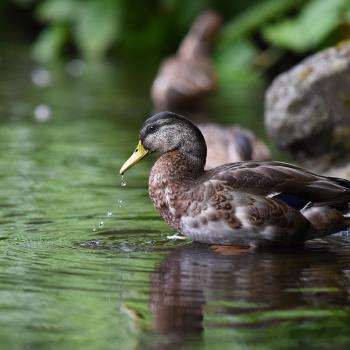
Today is the feast of the Immaculate Conception, which refers to Mary being conceived in the womb of her mother, St. Anne, without the stain of original sin which taints all of us. This aspect of her creation is honored, because to be created without original sin makes her the only sinless human creature to have lived. I’m sure just about everyone reading already knows this. It’s one of the most important feasts of the Church.
Atticus and I went to Mass last night for the vigil of the celebration. I love the Marian feasts. When they play hymns like “Hail, Holy Queen” I sort of feel like doing a fist pump and going “yeah!” when it’s over. Anyone else?
During the preparation of the gifts last night, I was reading the reflection for today’s feast in my Magnificat (which I love!) and this passage of Blessed John Henry Newman’s reflection made me stop dead in my tracks:
…She is deserving to be preached abroad because she never committed any sin, even the least; because sin had no part in her; because, through the fullness of God’s grace, she never thought a thought, or spoke a word, or did an action, which was displeasing, which was not most pleasing to Almighty God; because in her was displayed the greatest triumph over the enemy of souls…
This passage stopped me because it occurred to me that I could not conceive of this. I tried to imagine what it would be like to (a) be in the presence of someone who had never thought a thought, spoke a word, or did an action which was displeasing to God or (b) be that someone.
Incomprehensible on both counts. Much like the moments when I try to contemplate the trinity or what eternity might be like, I just couldn’t wrap my mind around it.
All I could come up with was this: “She must have been fearsome to behold.”
Fearsome in the way that thunderstorms are fearsome; they inspire awe. Here is someone who is made of the same “stuff” as me; she is a creature, not sharing in God’s nature they way her Son did. Here is a woman who was fully human, yet who never committed even the most venial of venial sins.
Her entire life, she never did anything which in any way was not pleasing to God. How could it be anything other than awe-inspiring to be in her presence? We always imagine Mary’s gentleness, and her tender loving motherhood, which we should. She is mother of us all.
But, as Christ shows us in the temple turning over tables, sometimes doing the will of God is not all gentleness and tenderness. Christ is the Lion of Judah; surely his mother could be the lioness, for God uses women as warriors too.
What really hammered it home for me was trying to imagine someone being able to describe me in that way. And how utterly laughable and shameful it would be. How so many times each and every day I think, say, or do things which, if not outright displeasing to God, are certainly not outright pleasing either.
I imagine it even could hurt to be in the presence of Mary, to witness her sanctification and sinless-ness, her charity in all things. It would have burned the way that purification always does. It hurts to be pruned and perfected. But how could being in the presence of the “highest of our race” result in anything but wanting to be perfected, and purified for the sake of God’s glory? And how could becoming more and more like Mary do anything but draw us closer to Christ?
Fearsome to behold.
In honor of mama Mary’s feast day, here is one of my favorite poems inspired by her, written by Gerard Manley Hopkins, SJ.
Rosa Mystica
‘The Rose is a mystery’ – where is it found?
Is it anything true? Does it grow on the ground?
It was made of the earth’s mould, but it went from men’s eyes,
And its place is a secret, and shut in the skies.
In the Gardens of God, in the daylight divine
Find me a place by thee, Mother of mine.
But where was it formerly? Which is the spot
That was blest in it once, though now it is not?
It is Galilee’s growth; it grew at God’s will
and broke into bloom upon Nazareth Hill.
In the Gardens of God, in the daylight divine
I shall look on thy loveliness, Mother of mine.
What was its season, then? How long ago?
When was the summer that saw the Bud blow?
Two thousands of years are near upon past
Since its birth, and its bloom, and its breathing its last.
I shall keep time with thee, Mother of mine.
Tell me the name now, tell me its name:
The heart guesses easily, is it the same?
Mary, the Virgin, well the heart knows,
She is the Mystery, she is that Rose.
In the Gardens of God, in the daylight divine
I shall come home to thee, Mother of mine.
Is Mary that Rose then? Mary, the tree?
But the Blossom, the Blossom there, who can it be?
Who can her Rose be? It could be but One:
Christ Jesus, our Lord – her God and her Son.
In the Gardens of God, in the daylight divine
Shew me thy son, Mother, Mother of mine.
What was the color of that Blossom bright?
White to begin with, immaculate white.
But what a wild flush on the flakes of it stood,
When the Rose ran in crimsoning down the Cross wood.
In the Gardens of God, in the daylight divine
I shall worship the Wounds with thee, Mother of mine.
How many leaves had it? Five they were then,
Five like the senses, and members of men;
Five is the number by nature, but now
They multiply, multiply, who can tell how.
In the Gardens of God, in the daylight divine
Make me a leaf in thee, Mother of mine.
Does it smell sweet, too, in that holy place?
Sweet unto God, and the sweetness is grace;
The breath of it bathes the great heaven above,
In grace that is charity, grace that is love.
To thy breast, to thy rest, to thy glory divine
Draw me by charity, Mother of mine.











